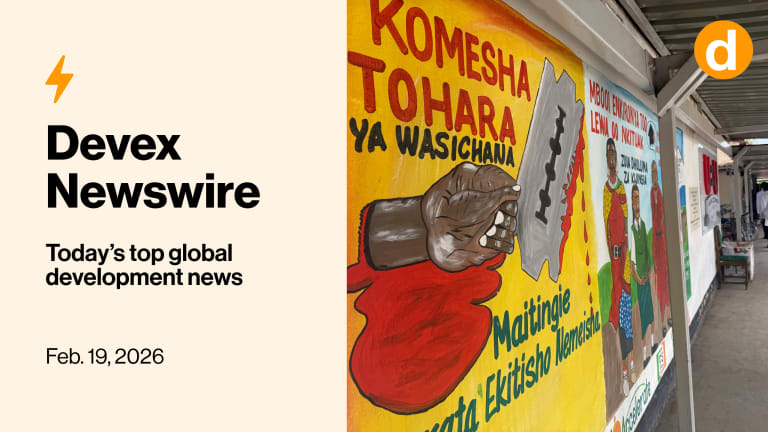McKinsey-Devex survey results: Practitioners see need for new approaches to system-wide reform
Co-authored by Nick Lovegrove, Biniam Gebre, Tony Lee and Raj Kumar
Since the beginning of the economic downturn, developed countries have been exercising greater scrutiny over their aid budgets, and their primary focus has naturally been on the impact of development aid. So in advance of the Fourth High-Level Forum on Aid Effectiveness in Busan, South Korea, Devex partnered with McKinsey & Co. to find out how professionals in the development community view the effectiveness of their own agencies and of the development sector overall.
In January and February 2011, we administered the McKinsey and Devex Development Agency Effectiveness Survey to 1,210 respondents. Our survey participants were people working at headquarters and on the ground for international nongovernmental organizations and development agencies. The survey results provide a glimpse into the trends practitioners believe are affecting development impact — and what they think needs to change.
Optimism despite challenges
The good news is that the majority of respondents are optimistic that aid will have a positive impact on the lives of those who need it. Fifty-four percent of aid agency staff members and 56 percent of non-agency personnel answered “yes” to the question, “Is the development landscape evolving in a way that will be beneficial to the world’s poor?”
Participants recognize, however, that they are working within a new, more demanding environment in which norms are constantly changing. The survey shows that seven factors are having a significant or fundamental impact on development agencies’ tasks (see Exhibit 1). Not surprisingly, the top two factors have to do with the increased pressure to show impact and greater scrutiny over donor budgets. Further complicating matters, the landscape is changing rapidly, as new topics emerge on the development agenda, aid recipients have more diverse needs, pressure for partner country ownership increases, new players and funding sources proliferate, and there are increasing calls for more coordination across agencies.

System-wide reform needed
Clearly the most pressing need for aid agencies is the ability to demonstrate impact. Yet only 36 percent of those surveyed said that most aid projects achieve their intended impact. As might be expected, leakage is seen as a serious impediment to aid effectiveness. More than 50 percent of participants believe that overhead costs, high fees, and inefficient (sometimes even questionable) contracting and procurement processes contribute to at least 10 percent leakage in the aid system.
The key to better effectiveness, according to survey participants, is system-wide reform. An overwhelming majority said recipient countries, donors, aid agencies and implementers need to undergo substantial or even fundamental change. The problem is that, for agencies that have tried to reform, only about half see themselves as having improved. This is true regardless of the type of reform attempted, whether structural, procedural, talent-related or cultural.
To help focus future reform efforts aimed at improving impact, we asked respondents to rate the agency with which they are most familiar on 14 different practices (see Exhibit 2). For a majority of respondents, four areas stand out as needing improvement: planning for financial sustainability, ensuring stakeholder skills to sustain the program, forward-planning allocations, and evidence-based resource allocation. The good news is that in some ways, agencies start from a position of strength. Participants believe that agencies are at their best during the initial stages of a program, such as when building partnerships and formulating plans. About two-thirds of respondents point to four practices as strengths: defining strategy based on strengths, accounting for local conditions and constraints, working with partner governments, and shaping programs collaboratively with stakeholders.

What’s next?
Our survey should be of particular interest to those who gathered in Busan – and the development community at large – as they establish new partnerships and forge stronger ties for development cooperation. Further, a new trend toward documentation and statistical evidence could soon emerge due to a recent development: Some OECD aid agencies have begun to streamline their contracting and procurement processes and strengthen their capacity for monitoring and evaluation.
Devex and McKinsey hope, with this survey and other efforts, to contribute to baseline research upon which discussions about the future of aid can be based. Studying how development agencies can respond to calls for better development impact is important to create sustainable change for people in need.
Nick Lovegrove is a director in McKinsey’s Washington, D.C., office, where Biniam Gebre is a partner and Tony Lee is a consultant. Raj Kumar is the president of Devex.
Search for articles
Most Read
- 1
- 2
- 3
- 4
- 5








